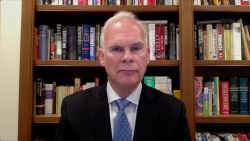The occupant of the Quirinale, the presidential palace in Rome, is meant to be above the daily cut and thrust of politics. Sergio Mattarella has been the model of restraint in his three years as President – until now.
Mattarella, a 75-year-old Sicilian and veteran politician, is known as a man of few words. But those he spoke Sunday night have sparked a constitutional crisis and populist outrage. He rejected a key appointment in the Cabinet of Prime Minister-designate Giuseppe Conte: that of euroskeptic Paolo Savona as finance minister.
And he was blunt about the reason. “The uncertainty over our position in the euro alarmed Italian and foreign investors,” Mattarella said. The rising price of Italian debt would burn through savings and hurt companies.
“Membership of the euro is a fundamental choice for the future of our country and our young people,” the President added.

The man who once described his job as that of a “political referee” was brandishing the red card, and Italy entered its 84th day without a government.
Conte – a lawyer with no political experience – has now given up trying to form a government, which may be just as well because he was under growing pressure to explain an academic resume that appears to have been embellished.
But the populist alliance of the Five Star Movement and the League that had chosen him and was on the cusp of power has reacted furiously.
Populist parties angered
Its outrage is all the greater because Mattarella’s politics are left-of-center. Luigi Di Maio, leader of Five Star and rarely short of a colorful phrase, said: “In this country, you can be a condemned criminal, convicted of tax fraud, under investigation for corruption and still be a minister. But if you criticize Europe, you can’t be economy minister.”
He even suggested Mattarella could be impeached, but League leader Matteo Salvini, who once derided Mattarella as a “cattocommunista” (communist Catholic), has for now played down that option.
Five Star and the right-wing League won 33% and 17% of votes respectively in the March election, a dramatic breakthrough for insurgent parties.
Mattarella’s decision to block the appointment of Savona gave the financial markets a brief respite – with the yield on the Italian 10-year bond easing and Milan’s stock exchange rising in early trading. But in the longer term, investors will return to themes that have long haunted them: Italy’s massive debt (2.1 trillion euros and rising), an inflexible labor market and dysfunctional political system. Plus the prospect of Five Star and the League increasing their vote and implementing an unorthodox combination of tax cuts and higher welfare spending.
The doyens of the European Union are also breathing a sigh of relief after Mattarella’s intervention. External Affairs Commissioner Federica Mogherini, herself a former member of the Italian Parliament, said she had full trust in Italian institutions, “starting with the Italian President who is the guarantor of the Italian constitution.”
Their anxiety is understandable. Savona had talked about Italy leaving the eurozone (though he has moderated his views recently) and League leader Salvini had complained: “Italy is not a colony, we are not slaves of the Germans, the French, the [bond] spread or finance.”
What next?

Mattarella has asked a former International Monetary Fund official, Carlo Cottarelli, to form a government of technocrats. Cottarelli accepted the nomination on Monday. But his cabinet would have to get the approval of Parliament, where the League and Five Star have a majority in both houses.
Salvini has already raised the stakes, warning other conservative parties such as Silvio Berlusconi’s Forza Italia against supporting Cottarelli.
“If Berlusconi votes Cattarelli, goodbye alliance,” Salvini told Italian radio on Monday.
For its part, Forza Italia won’t vote for any technocratic government, a party spokesman said on Monday.
But some in Europe’s corridors of power even look to Berlusconi as a safe pair of hands in the midst of this crisis. Berlusconi, who is now 81 and still tainted by innumerable corruption allegations, could emerge as kingmaker in a government comprising moderate parties, but they would have to perform considerably better than they did in March.
Eurocrats in Brussels (and no doubt German Chancellor Angela Merkel and French President Emmanuel Macron) will be hoping that the League and Five Star’s fractious entente falls apart, but the parties’ supporters may actually be galvanized by Mattarella’s act of “resistance” when Italians go the polls again, which could be in September if no government is formed.
The President will not be perturbed by the fireworks he has set off. There are few harder training grounds than the politics of Sicily, where Mattarella cut his political teeth. In fact, his older brother Piersanti was shot by the Mafia in 1980, and died in his brother’s arms.





















